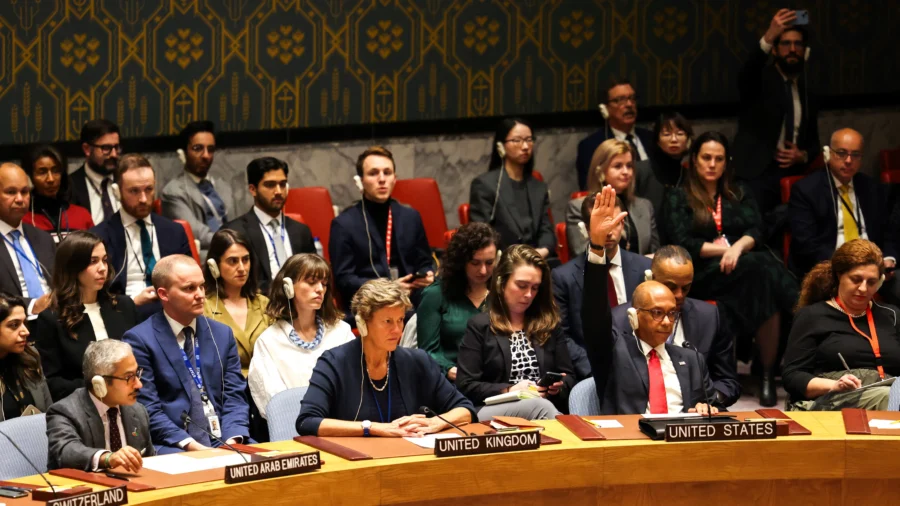After weeks of negotiations, the United Nations Security Council (UNSC) adopted a resolution on Friday to expand humanitarian aid into the Gaza Strip.
The resolution passed in the 15-member UNSC with the support of 13 members, while Russia and the United States—which both have veto power as permanent members—elected to abstain from the vote.
The successful passage of the resolution on Friday came two weeks after the United States vetoed an earlier resolution that called for an immediate ceasefire in the Israel-Hamas war. This latest UNSC resolution drops the call for a full and immediate ceasefire in favor of increased humanitarian aid efforts during the ongoing conflict. Russia had offered an amendment that would have expanded the measure into a call for a full suspension of hostilities, but the U.S. side vetoed the proposal.
Russian Ambassador to the UN Vassily A. Nebenzia called the resolution that passed on Friday “extremely neutered” and said a full ceasefire remains an imperative.
In a Thursday night press statement, U.S. Ambassador to the UN Linda Thomas-Greenfield insisted the Gaza resolution is not “watered down.” On Friday, Ms. Thomas-Greenfield said the resolution the UNSC finally adopted creates conditions “for a sustainable cessation of hostilities” at some indeterminate point in the future. She also argued the Russian side had little right to lecture about the need for a ceasefire or claim the moral high ground on humanitarian issues as Russian forces continue to fight in Ukraine following their February 2022 invasion.
Security Council resolutions are legally binding, but in practice many parties choose to ignore the council’s requests for action.
U.N. Secretary-General António Guterres also expressed hopes that Friday’s resolution would lead to an eventual ceasefire.
Much of the negotiations for the Gaza humanitarian resolution took place between the United States and the United Arab Emirates, whose delegation sponsored the resolution. The negotiations also involved talks with Egypt, which does not currently have a seat on the UNSC but which neighbors the Gaza Strip. The UNSC repeatedly delayed a vote on the Gaza humanitarian resolution earlier this week as deliberations continued.
Friday’s vote comes a day after the U.N.’s World Food Programme published a report finding around one in four people in Gaza face “extreme hunger.”
This week, UNICEF Executive Director Catherine Russell also warned that Gaza is running low on clean drinkable water and that many children will die if the situation is not addressed. The U.N. organization said infrastructure damage and limited energy supplies had left at least half of UNICEF’s water and sanitation service facilities damaged or destroyed.
The Hamas terrorist group killed more than 1,300 Israelis when they attacked Israel on Oct. 7, including women and children. They also took about 247 hostages.
Brett Jonathan Miller, ambassador and deputy permanent representative of Israel, said that in the 77 days since Hamas attacked Israel “this Council still has yet to issue a single statement condemning Hamas and their atrocities.”
Since Oct. 7, Israeli forces have conducted extensive airstrikes and ground combat operations throughout the Gaza Strip. The Hamas-controlled health ministry in Gaza has estimated that around 20,000 people have been killed since then. The health ministry does not differentiate between fighters and civilians.
U.S. and Israeli officials have called the Gaza health ministry’s figures into question.
In November, White House National Security Council spokesman John Kirby said, “We still don’t believe that taking the Ministry of Health’s numbers at face value is wise” but said the United States side also could not provide an alternative number and is not disputing that “many, many thousands of innocent people in Gaza” have been killed.
The Associated Press contributed to this article.

